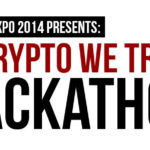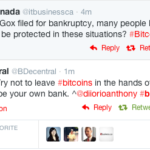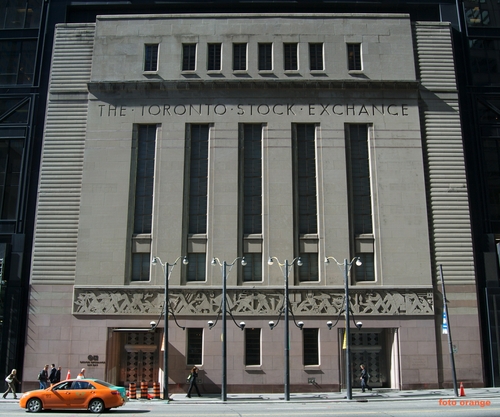BDA Mentor Brock Pierce on why he thinks Bitcoin will be more revolutionary than the Internet.
BDA Mentor, Andreas Antonopoulos, on the Joe Rogan Experience podcast.
Selling Bitcoins: Do You Need to Charge HST?
This blog post looks at the issue of whether sellers of bitcoins need to charge HST. It was written by Addison Cameron-Huff, a lawyer who specializes in Bitcoin. Tax is a complex area and you should seek accounting/legal advice before acting.
Most stores in Ontario that sell goods are required to charge 13% HST. According to the CRA:
“Almost everyone has to pay the GST/HST on purchases of taxable supplies of property and services (other than zero-rated supplies). A limited number of sales or supplies are exempt from GST/HST.”
One transaction that is exempt from HST is the sale of “gift certificates”, as provided for in s. 181.2 of the Excise Tax Act:
“… the issuance or sale of a gift certificate for consideration shall be deemed not to be a supply and, when given as consideration for a supply of property or a service, the gift certificate shall be deemed to be money.”
The Excise Tax Act does not define “gift certificate” but in 2012 the CRA issued a policy statement that explains their view on what a gift certificate is. The CRA’s definition of gift certificate requires the following five attributes:
“1. It has a monetary exchange value that is evident on the certificate or that is easily determined by the parties involved in the transaction. The monetary exchange value may, for example, be specified on the face of the certificate or it may be stored on the certificate electronically. In certain cases, the customer may be permitted to add additional amounts to the monetary exchange value of the certificate. Alternatively, the gift certificate may be for a particular supply of property or a service that is identified on the certificate.
- It is issued or sold for consideration by the supplier of the property or service or another party for use at a particular supplier. The consideration paid for the certificate may not necessarily be the same as the monetary exchange value.
- It is accepted as payment or partial payment of the consideration for a supply of property or a service offered by the supplier of that property or service.
- It does not require the bearer to do anything to redeem the certificate other than to present it as a means of payment or partial payment for the property or services being acquired. The holder of the certificate should not be required to meet other conditions, such as, making a purchase of a particular value (i.e., a required minimum value) or purchasing one item to exchange the gift certificate for another item (e.g., buy one, get one free) in order to redeem the certificate.
- It does not have any intrinsic value. The certificate should not have any value other than its monetary exchange value.”
In addition to the CRA’s policy statement there is case law that helps to explain what “gift certificate” means in Canadian law such as Royal Bank of Canada v. The Queen, 2007 TCC 281.
There are severe penalties for failing to comply with tax obligations. A seller of goods who fails to charge HST could be liable for the entire amount that should have been charged (with interest and penalties) and, if the seller is a corporation, liability may extend to the director(s).
It is possible to request from the CRA a tax ruling or interpretation regarding HST obligations: http://www.cra-arc.gc.ca/E/pub/gp/rc4405/rc4405-e.html, but this please note that interacting with the CRA may result in negative tax consequences. You are strongly advised to seek the advice of a tax professional before starting to sell bitcoins or charging/not charging HST.
Do the Consumer Protection Act Gift Card Rules Apply to Bitcoin Sales?
This blog post discusses the applicability of the Ontario Consumer Protection Act, 2002 gift card rules to the purchase of bitcoins. It was written by Addison Cameron-Huff, a lawyer who specializes in Bitcoin. He highly recommends that you seek legal advice when deciding whether the Consumer Protection Act, 2002 applies to your transactions.gift cards and bitcoins
The Consumer Protection Act, 2002 (CPA)is the main consumer protection law in Ontario. Among its many provisions are rules about “gift cards”, a concept that sounds like it could include bitcoins. If the sale of bitcoins is considered the sale of gift cards under the CPA then there could be fee limits for sales (ss. 25.4(2)(a) & 25.4(2.1)(b)) and potentially a consumer refund right (s. 25.4(3)-(4)).
Gift card is a defined term in the CPA:
“gift card” means a voucher in any form, including an electronic credit or written certificate, that is issued by a supplier under a gift card agreement and that the holder is entitled to apply towards purchasing goods or services covered by the voucher; …“gift card agreement” means a future performance agreement under which the supplier issues a gift card to the consumer and in respect of which the consumer makes payment in full when entering into the agreement; …“open loop gift card agreement” means a gift card agreement that entitles the holder of a gift card to apply it towards purchasing goods or services from multiple unaffiliated sellers.Consumer Protection Act, 2002, OR 17/05, s. 23.
The definition of gift card requires that the “holder is entitled to apply [it] towards purchasing goods or services covered by the voucher”. When a consumer purchases bitcoins they are not entitled as the holder of those bitcoins to apply them towards good or services. There are some merchants who accept bitcoins but this isn’t any different than merchants willing to barter for other goods. Since there’s no entitlement it seems unlikely that a bitcoin purchase could be considered a gift card purchase under the CPA.
Photo from http://www.flickr.com/photos/68751915@N05/6710889059/
Are Bitcoins “Securities” Under the Ontario Securities Act?
This blog post discusses the question of whether bitcoins are “securities” in Ontario. It was written by Addison Cameron-Huff, a lawyer who specializes in Bitcoin. He highly recommends that you seek legal advice on issues related to securities law.
If bitcoins are “securities” under Ontario securities law then there are important implications for anyone engaged in trading them.
According to the Ontario Securities Commission (the regulator of securities):
“In general, firms must register with the OSC if they conduct any of the following activities in Ontario:-are in the business of trading in, or advising on, securities. This is referred to as the “business trigger” for registration.-act as an underwriter or as an investment fund manager-conduct trading activities involving commodity futures contracts or commodity futures options.
Individuals must register if they:
-trade, advise or underwrite on behalf of a registered dealer or adviser, or-act as the ultimate designated person or chief compliance officer of a registered firm.
The main restriction on securities activities can be found in section 25(1) of the Ontario Securities Act:
“Unless a person or company is exempt under Ontario securities law from the requirement to comply with this subsection, the person or company shall not engage in or hold himself, herself or itself out as engaging in the business of trading in securities unless the person or company, a) is registered in accordance with Ontario securities law as a dealer or b) is a representative registered in accordance with Ontario securities law as a dealing representative of a registered dealer and is acting on behalf of the registered dealer”Securities Act, R.S.O. 1990, c. S.5, s. 25(1).
But what is a “security”? “Security” is a very broadly defined term that includes the following 19 sub-definitions:
(a) any document, instrument or writing commonly known as a security,(b) any document constituting evidence of title to or interest in the capital, assets, property, profits, earnings or royalties of any person or company,(c) any document constituting evidence of an interest in an association of legatees or heirs,(d) any document constituting evidence of an option, subscription or other interest in or to a security,(e) a bond, debenture, note or other evidence of indebtedness or a share, stock, unit, unit certificate, participation certificate, certificate of share or interest, preorganization certificate or subscription other than,(i) a contract of insurance issued by an insurance company licensed under the Insurance Act, and(ii) evidence of a deposit issued by a bank listed in Schedule I, II or III to the Bank Act (Canada), by a credit union or league to which the Credit Unions and Caisses Populaires Act, 1994 applies, by a loan corporation or trust corporation registered under the Loan and Trust Corporations Act or by an association to which the Cooperative Credit Associations Act (Canada) applies,(f) any agreement under which the interest of the purchaser is valued for purposes of conversion or surrender by reference to the value of a proportionate interest in a specified portfolio of assets, except a contract issued by an insurance company licensed under the Insurance Act which provides for payment at maturity of an amount not less than three quarters of the premiums paid by the purchaser for a benefit payable at maturity,(g) any agreement providing that money received will be repaid or treated as a subscription to shares, stock, units or interests at the option of the recipient or of any person or company,(h) any certificate of share or interest in a trust, estate or association,(i) any profit-sharing agreement or certificate,(j) any certificate of interest in an oil, natural gas or mining lease, claim or royalty voting trust certificate,(k) any oil or natural gas royalties or leases or fractional or other interest therein,(l) any collateral trust certificate,(m) any income or annuity contract not issued by an insurance company,(n) any investment contract,(o) any document constituting evidence of an interest in a scholarship or educational plan or trust, and(p) any commodity futures contract or any commodity futures option that is not traded on a commodity futures exchange registered with or recognized by the Commission under the Commodity Futures Act or the form of which is not accepted by the Director under that Act,
whether any of the foregoing relate to an issuer or proposed issuer”Securities Act, R.S.O. 1990, c. S.5, s. 1(1).
Some of the sub-definitions clearly can’t apply to bitcoins (e.g. “any certificate of interest in an oil, natural gas or mining lease, claim or royalty voting trust certificate”). Others, such as “investment contract” require the assistance of case law to interpret.
There’s very little information available about the position of the Ontario Securities Commission. An Ottawa Citizen article published on February 25th, 2014 notes that “[t]he Ontario Securities Commission has said it is closely monitoring developments pertaining to digital currencies”.
A securities lawyer can help you understand whether Ontario’s securities regulation regime is applicable to your Bitcoin business.
Photo from http://www.flickr.com/photos/foto_orange/11921659744/
The IRS and CRA on Bitcoin
The IRS (US tax authority) recently released a six page document with 16 questions and answers that explain position on Bitcoin: http://www.irs.gov/pub/irs-drop/n-14-21.pdf.irs and cra on bitcoin
Our own CRA hasn’t put quite so much pen to paper but did post a fact sheet on digital currency late last year: http://www.cra-arc.gc.ca/nwsrm/fctshts/2013/m11/fs131105-eng.html.
Photo from http://www.flickr.com/photos/51486173@N00/223052548/
World’s First Accelerator for Bitcoin & Next Gen Cryptocurrencies Launches in Canada
FOR IMMEDIATE RELEASE:
World’s First Accelerator for Bitcoin & Next Gen Cryptocurrencies Launches in Canada
Toronto-based Bitcoin Decentral Accelerate will work with world-class mentors to develop and grow cryptocurrency ventures
TORONTO, March 6 2014 — Bitcoin Decentral, Canada’s pre-eminent hub for the decentralized Bitcoin community is launching Bitcoin Decentral Accelerate, the world’s first technology startup accelerator dedicated to funding and growing startups focused on next generation cryptocurrencies and disruptive tech.
Bitcoin Decentral is an innovative technology business development centre that has successfully built an established Bitcoin community of passionate experts, entrepreneurs, advocates, and volunteers, from its eclectic offices in a turn-of-century four-story building in downtown Toronto, Canada.
Bitcoin Decentral Accelerate is the first global accelerator that is driven by key players and mentors from the Bitcoin sector. Canada’s favorable cryptocurrency business environment makes this Toronto-based location an ideal strategic launchpad for startups from around the world.
“We have created a unique accelerator that takes advantage of the booming innovation opportunities around the next generation of Bitcoin and other disruptive technologies”, says Anthony Di Iorio, the accelerator’s CEO, founder and general partner. “We have received resounding support from the community, initial investors and mentors, and are laying a strong foundation to build a world-class center of excellence in this emerging segment.”
Bitcoin Decentral Accelerate is at the heart of an existing Bitcoin community of entrepreneurship and technical innovation. Launching with a unique set of mentors from the global cryptocurrency space and traditional startup businesses, select investors that can lead follow-on financing rounds, a proven program curriculum that is customized for each startup, experienced managing partners and advisors, and unparalleled insights and visibility from being an integral part of the Bitcoin/Ethereum global ecosystem.
A. Traviss Corry, known for his work in developing internationally recognized accelerator programs, will take the role of Managing Director and founding partner. He will guide the startups through a three month custom program driven by many key recognized mentors in the sector.
William Mougayar, founder of Startup Management, an experienced entrepreneur and thought leader in the startup space, will take the role of Special Advisor, and help in developing the accelerator’s networks, and connecting startups with the tech community, as well as being a mentor.
“We have assembled the optimum mentor and investor network for the cryptocurrency space.” says A. Traviss Corry, Managing Director of Bitcoin Accelerate. “Working with our mentors, our acceleration program is structured as a three month curriculum of due diligence deliverables that is customized for each startup’s unique needs. This approach is a roadmap that strongly prepares startups for their future success.”
Bitcoin Decentral Accelerate launches with a core group of highly engaged mentors, as part of a network of over 100 mentors. This roster has commitments from the top tier of the cryptocurrency space, including Ethereum co-founders Vitalik Buterin and Anthony Di Iorio, investor Brock Pierce, Coinapult founder Erik Voorhees, BitPay CEO Tony Gallippi, Blockchain Chief Security Officer Andreas Antonopoulos, monetary expert Trace Meyer, Chairman of the Bitcoin Foundation’s Regulatory Affairs Committee Marco Santori, BitAngels co-founder David A. Johnston, Hummingbird Venture Partner Pamir Gelenbe, strategist Jason King, Social Radius CEO Michael Terpin, investor Matthew Roszak, Monetas CEO Johann Gevers, QuickBT founder Jamie Robinson, gaming and cryptocurrency attorney Stuart Hoegner, Griffen Ventures CEO Manie Eagar, MontCombine’s Rik Willard, Wild Apricot founder Dmitry Buterin, software professional Joseph Lubin, and Director at the Bitcoin Alliance of Canada and founder of Bitcoinsultants Michael Perklin.
Startups that are accepted into the program receive an initial investment from the accelerator’s fund in exchange for a small equity stake, as well as significant perks. Upon graduation, startups will receive an additional investment commitment that will seed their follow-on round.
Applications are now open online. The first selected startups will be announced at the Bitcoin Expo on April 11-13 in Toronto, providing the first participants with instant global exposure. This initial cohort will be expected to start on April 21st, and a total of 9 groups will run through this program, initially.
For investment and mentorship inquiries, please contact info@BDAccelerate.com
About Bitcoin Decentral Accelerate
Bitcoin Decentral Accelerate is a Toronto-based startup accelerator dedicated to Bitcoin, cryptocurrencies, and related disruptive technologies, including a focus on the next generation of economic and financial services in Fintech. BD Accelerate will run a 3-month curriculum structured program, driven by expert mentors, strong valued investors, and a supportive community; all immersed in an emerging revolutionary tech sector, full of passionate people, working to build a better globally decentralized economy. For more info, please visit http://bdaccelerate.com, and follow @bdecentral on Twitter.
About Bitcoin Decentral
Founded by successful Bitcoin community builder, investor, and entrepreneur, Anthony Di Iorio, Bitcoin Decentral is a disruptive business development centre, and digital global hub for innovation in Bitcoin, Cryptocurrency, Fintech and related disruptive technologies. The centre is in a historic and eclectic 100-year old, 4-story building in downtown Toronto, housing several cryptocurrency related ventures as well as events. Bitcoin Decentral provides a co-working space on its main floor, offices and a startup accelerator above, as well as in-house expert educational information, and an unparalleled network of global relationships. Initial anchor tenants include Ethereum, KryptoKit, CoinTalk, the Bitcoin Alliance of Canada, Bitcoin Decentral Cowork, Bitcoin Decentral Accelerate and Bitcoinsultants. Bitcoin Decentral is also home of Toronto’s first and most active Bitcoin ATM, the meeting spot for the Toronto Bitcoin Meetup, and the headquarters for the upcoming 2014 Bitcoin Expo (April 11-13 2014).
# # #
Links to photos for press use:





 Made in Canada
Made in Canada